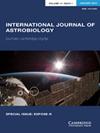Abiogenesis: the Carter argument reconsidered
IF 1
4区 物理与天体物理
Q3 ASTRONOMY & ASTROPHYSICS
引用次数: 0
Abstract
The observation of life on Earth is commonly believed to be uninformative regarding the probability of abiogenesis on other Earth-like planets. This belief is based on the selection effect of our existence. We necessarily had to find ourselves on a planet where abiogenesis occurred, thus nothing can be inferred about the probability of abiogenesis from this observation alone. This argument was first formalized in a Bayesian framework by Brandon Carter. Though we definitely had to find ourselves on a planet where abiogenesis occurred, I argue here that (1) the Carter conclusion is based on what is known as the ‘Old Evidence Problem’ in Bayesian Confirmation Theory and that (2) taking this into account, the observation of life on Earth is not neutral but evidence that abiogenesis on Earth-like planets is relatively easy. I then give an independent timescale argument that quantifies the prior probabilities, leading to the inference that the timescale for abiogenesis is less than the planetary habitability timescale and therefore the occurrence of abiogenesis on Earth-like planets is not rare.自然发生论:对卡特论点的重新思考
对地球上生命的观察通常被认为对其他类地行星上自然发生的可能性没有提供信息。这种信念是基于我们存在的选择效应。我们必须在一个发生自然发生的星球上找到自己,因此,仅从这一观察无法推断出自然发生的可能性。这个论点首先由布兰登·卡特在贝叶斯框架中形式化。虽然我们必须找到一个发生自然发生的行星,但我在这里认为:(1)卡特的结论是基于贝叶斯确认理论中所谓的“旧证据问题”,(2)考虑到这一点,对地球上生命的观察不是中立的,但证据表明,类地行星上的自然发生相对容易。然后,我给出了一个独立的时间尺度论证,量化了先验概率,从而得出结论:自然发生的时间尺度小于行星可居住的时间尺度,因此,在类地行星上发生自然发生并不罕见。
本文章由计算机程序翻译,如有差异,请以英文原文为准。
求助全文
约1分钟内获得全文
求助全文
来源期刊

International Journal of Astrobiology
地学天文-地球科学综合
CiteScore
3.70
自引率
11.80%
发文量
45
审稿时长
>12 weeks
期刊介绍:
International Journal of Astrobiology is the peer-reviewed forum for practitioners in this exciting interdisciplinary field. Coverage includes cosmic prebiotic chemistry, planetary evolution, the search for planetary systems and habitable zones, extremophile biology and experimental simulation of extraterrestrial environments, Mars as an abode of life, life detection in our solar system and beyond, the search for extraterrestrial intelligence, the history of the science of astrobiology, as well as societal and educational aspects of astrobiology. Occasionally an issue of the journal is devoted to the keynote plenary research papers from an international meeting. A notable feature of the journal is the global distribution of its authors.
 求助内容:
求助内容: 应助结果提醒方式:
应助结果提醒方式:


